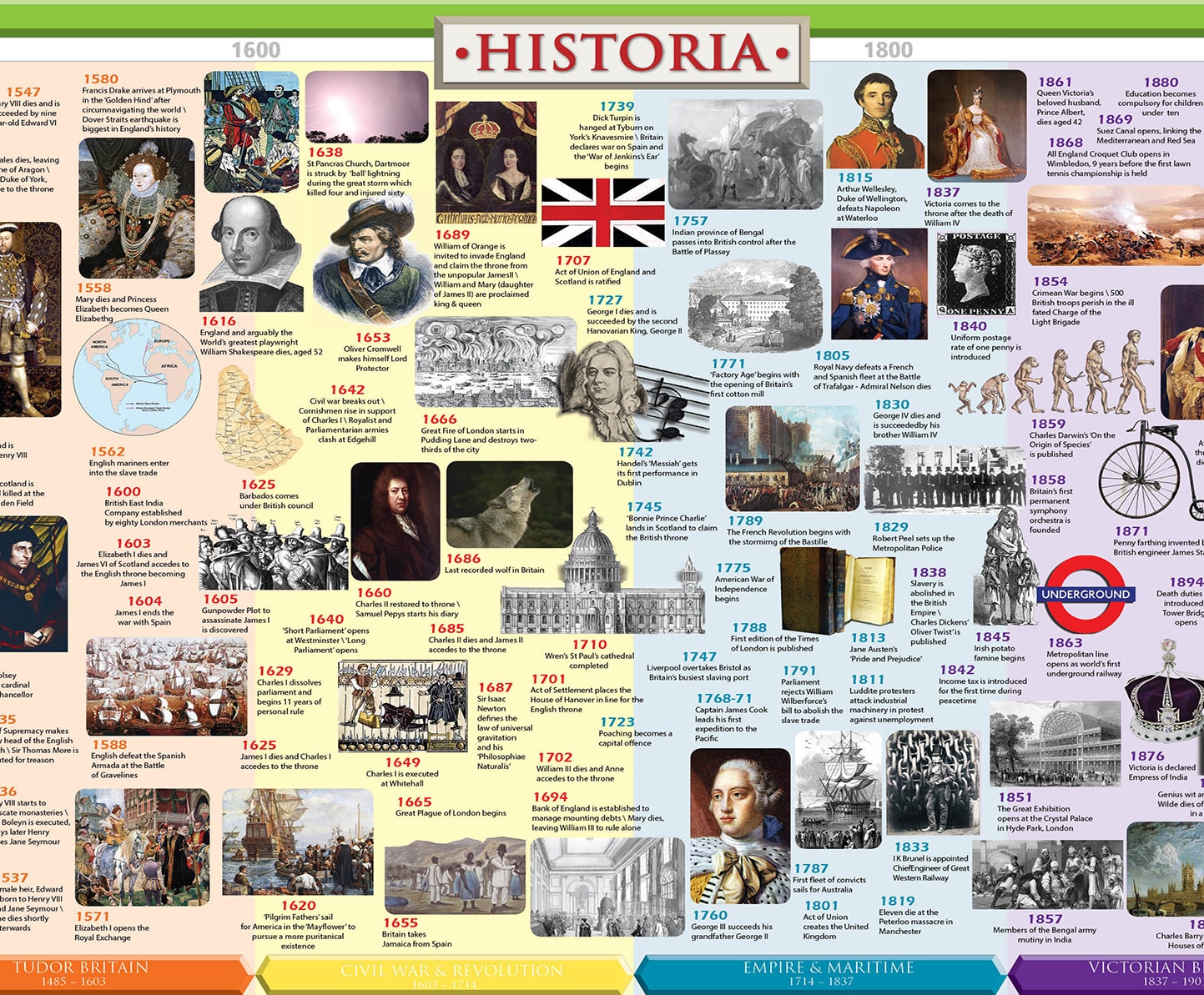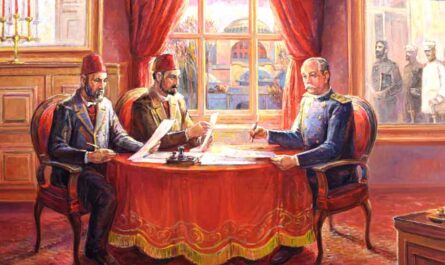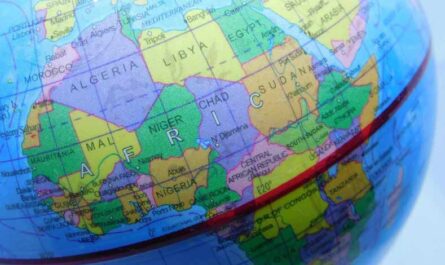Major Events in History- History is the examination of the past, originated from the Greek word, historia, meaning “inquiry, or knowledge acquired by the investigation. Events occurring before the invention of writing methods are thought of as prehistory.
“History” is an umbrella time period that pertains to previous occasions in addition to the reminiscence, discovery, assortment, organization, presentation, and interpretation of information about these occasions.
Historians place the previous in context utilizing historic sources corresponding to written paperwork, oral accounts, ecological markers, and materials objects together with artwork and artifacts.
History additionally contains the educational self-discipline which makes use of narrative to explain, study, query, and analyze a sequence of previous occasions, and examine the patterns of trigger and impact which might be associated with them. Historians search to know and symbolize the previous via narratives.
They usually debate which narrative finest explains an occasion, in addition to the importance of various causes and results. Historians additionally debate the character of history and its usefulness by discussing the examination of self-discipline as an end in itself and as an approach to offering a “perspective” on the issues of the present.
Stories widespread to a specific culture, however not supported by exterior sources (such as because the tales surrounding King Arthur), are often categorized as cultural heritage or legends. History differs from fantasy in that it’s supported by proof.
However, ancient influences have helped spawn variant interpretations of the character of history which have advanced over the centuries and proceed to alter immediately.
The modern examination of history is wide-ranging and contains the examination of particular areas and the examination of sure topical or thematic components of the historic investigation. History is usually taught as a part of main and secondary education, and the educational study of history is significant self-discipline in college research.
Herodotus, a Fifth-century BC Greek historian is usually thought of (throughout the Western custom) to be the “father of history”, or, the “father of lies”.Along together with his modern Thucydides, he helped type the foundations for the modern examination of human history.
Their works proceed to learn immediately, and the hole between the culture-focused Herodotus and the military-focused Thucydides stays some extent of rivalry or method in modern historic writing. In East Asia, a state chronicle, the Spring and Autumn Annals, was identified to be compiled from as early as 722 BC though solely 2nd-century BC texts have survived.
Major Events in History
The following table illustrates the major events in history along with respective timeline:
| Time | Events |
|---|---|
| 10000 BCE | Middle East people domesticated goats and dogs. |
| 9500 BCE | Settled farming began. |
| 6000 BCE | Copper was discovered. |
| 5000 BCE | Sumerian civilization evolved between the rivers Euphrates and Tigris. Later it became popular as Mesopotamia (present-day Iraq). |
| 5000 BCE | The first calendar of 365 days, 12 months, and 30 days invented. |
| 3500 BCE | Bronze was discovered in Egypt. |
| 3100 BCE | The first dynasty of Egypt. |
| 3000 BCE | Early writing. |
| 2600 BCE | Indus Valley civilization. |
| 2560 BCE | Great Pyramid of Giza. |
| 2000 – 1200 BCE | Iron Age. |
| 1800 BCE | Alphabetic writing appeared. |
| 1700 BCE | End of Indus Valley Civilization. |
| 1400 BCE | The water clock is invented in Egypt. |
| 1027 BCE | In China, the Chou Dynasty began. |
| 850 BCE | Homer had written the epic “Iliad and Odyssey”. |
| 776 BCE | Olympic Games first recorded. |
| 753 BCE | The city of Rome was established by Romulus. |
| 653 BCE | Rise of Persian Empire. |
| 600 BCE | Sixteen Maha Janapadas emerged in India. |
| 586 BCE | The First Temple in Jerusalem (Solomon’s Temple) was destroyed by the Babylonians. |
| 550 BCE | Pythagoras (Greek scholar) studied the movements of celestial bodies and mathematics. |
| 509 BCE | The founding of the Roman Republic after the exclusion of the last Roman King. |
| 508 BCE | Democracy introduced in Athens. |
| 500 BCE | Panini standardized the Sanskrit grammar and its morphology in the text Ashtadhyayi. |
| 500 BCE | Pingala learned the uses of the zero and binary numeral systems. |
| 499 BCE | Greco-Persian Wars. |
| 490 BCE | Battle of Marathon. |
| 338 BCE | In the Battle of Chaeronea, king Philip II defeated the combined forces of the Greek city-states Athens and Thebes. |
| 337 BCE | Philip II had created a strong and unified nation in Macedonia. He hired Aristotle (the Philosopher) to tutor his son, Alexander. |
| 336 BCE | Philip II was assassinated and Alexander became king. |
| 331 BCE | In the Battle of Gaugamela, Alexander the Great defeated Darius III of Persia. |
| 326 BCE | In the Battle of the Hydaspes River, Alexander the Great defeated Indian king Porus |
| 323 BCE | Death of Alexander at Babylon |
| 300 BCE | The Great Pyramid of Cholula constructed |
| 221 BCE | Qin Shi Huang unified China and the beginning of Imperial rule (in China) |
| 221 BCE | The Qin Dynasty began the construction of the Great Wall of China |
| 206 BCE | After the death of Qin Shi Huang, Han Dynasty established in China |
| 200 BCE | Paper is invented in China |
| 124 BCE | China’s Imperial University was established |
| 111 BCE | First Chinese domination of Việtnam as the Nanyue Kingdom |
| 4 BCE | Birth of Jesus Christ (Widely accepted date) |
| Major Events in History: Common Era (CE) | |
| 29 CE | Jesus Christ crucified |
| 70 CE | The armies of Titus destructed Jerusalem |
| 78 CE | Origin of Saka Era in India |
| 79 CE | Mount Vesuvius erupted and destructed Pompeii and other towns (in Italy) |
| 220 CE | After the fall of the Han Dynasty, three Kingdoms period begins in China |
| 378 CE | The Germanic tribes defeated a Roman army in the battle of Adrianople |
| 570 CE | Prophet Mohammed (the founder of the Muslim religion) born |
| 581 CE | Sui Dynasty came to China |
| 613 CE | Muhammad had commenced preaching publicly in his hometown, Mecca |
| 622 CE | Muhammad Migrated from Mecca to Medina |
| 623 CE | Muhammad abandoned Saturday as the Sabbath and made Friday a special day of the week |
| 632 CE | Muhammad died |
| 660 CE | The Quran, the holy book, was published for the first time |
| 793 CE | Scandinavians approached the island of Lindisfarne, Scotland by boat and they attacked monks and robbed their monastery. It is the first recorded raid by the Vikings |
| 800 CE | Gunpowder was invented |
| 1050 CE | An ancient tool of navigation namely The astrolabe” was first used in Europe |
| 1077 CE | Construction of the London Tower began |
| 1117 CE | The University of Oxford is established |
| 1150 CE | The University of Paris is established |
| 1199 CE | Europeans first used compasses |
| 1209 CE | The University of Cambridge is established |
| 1215 CE | John of England sealed the “Magna Carta” |
| 1298 CE | Marco Polo published his itinerary of China, along with Rustichello da Pisa. |
| 1299 CE | Osman I established the Ottoman Empire |
| 1347 CE | The Black Death withered Europe for the first (of many times). In the first year, an estimated 20 to 40% of the population was thought to have perished. |
| 1389 CE | Battle of Kosovo (in Serbia) |
| 1397 CE | The Medici bank was established in Florence |
| 1461 CE | King Loius XI of France started postal service |
| 1492 CE | Christopher Columbus discovered a route going to the New World (i.e. Caribbean Islands and America) |
| 1498 CE | Vasco da Gama arrived in India |
| 1503 CE | Leonardo da Vinci started making the painting of Mona Lisa; however, completed it after three years |
| 1506 CE | Christopher Columbus died in Valladolid, Spain |
| 1632 CE | The city of Boston is founded |
| 1636 CE | Harvard University is established in Cambridge, Massachusetts, USA |
| 1652 CE | Dutch East India Company founded the city Cape Town in South Africa |
| 1666 CE | The Great Fire of London |
| 1683 CE | China conquered the Kingdom of Tungning and annexes Taiwan |
| 1687 CE | Isaac Newton published “Philosophiae Naturalis Principia Mathematica” |
| 1694 CE | The Bank of England is established |
| 1697 CE | The earliest known first-class cricket match had taken place in Sussex |
| 1710 CE | The world’s first copyright legislation, Britain’s Statute of Anne (also known as Copyright Act 1709), took effect |
| 1724 CE | Japan began successful forest management reform and subsequently, timber cutting was reduced |
| 1765 CE | In France, a twenty-eight volume of the encyclopedia was completed |
| 1776 CE | In the USA, second Continental Congress meeting and declaration of independence July 4) |
| 1781 CE | The Spanish settlers founded the city of Los Angeles |
| 1783 CE | In the USA, King George declared the thirteen colonies as “free and independent” |
| 1783 CE | In the USA, based on the state’s 1780 constitution, the Supreme Judicial Court of Massachusetts ruled slavery illegal |
| 1785 CE | Napoleon Bonaparte became a lieutenant in the French artillery |
| 1787 CE | The United States Constitution is written in Philadelphia and submitted to the states for ratification |
| 1787 CE | The slaves freed from London established Freetown (West Africa) i.e. present-day Sierra Leone |
| 1795 CE | The first graphite pencils were used |
| 1789–1799 CE | French Revolution |
| 1797 CE | Napoleon’s invasion and partition of the Republic of Venice ended over 1,000 years of independence of the Serene Republic |
| 1801 CE | Napoleon (of France) defeated Austria |
| 1804 CE | Haiti attained its independence from France and became the first black republic |
| 1805 CE | In Milan (Italy), Napoleon was crowned as the King of Italy |
| 1805 CE | In the Battle of Austerlitz, Napoleon decisively defeated an Austrian-Russian army |
| 1814 CE | Napoleon abdicated and was exiled to Elba. |
| 1815 CE | Napoleon escaped; however, he was finally defeated at the Battle of Waterloo (in June) and exiled to Saint Helena Island |
| 1820 CE | Discovery of Antarctica |
| 1821 CE | Napoleon Bonaparte died (at Saint Helena Island, where he was exiled) |
| 1823 CE | Monroe Doctrine was declared by US President James Monroe |
| 1825 CE | The two railway station at Stockton and Darlington (the first public railway in the world) was opened |
| 1833 CE | Slavery Abolition Act banned slavery throughout the British Empire |
| 1835 CE | Vaccination became mandatory in Britain |
| 1838 CE | Charles Darwin developed the theory of evolutionary selection and specialization |
| 1840 CE | New Zealand is established, as the Treaty of Waitangi is signed between the Māori and British |
| 1841 CE | Richard Owen, first time, used the word “dinosaur” |
| 1842 CE | First-time Anaesthesia was used |
| 1845-49 CE | The Irish Potato Famine that leads to the Irish diaspora |
| 1848-58 CE | California Gold Rush |
| 1848 CE | Karl Marx wrote Communist Manifesto |
| 1849 CE | Roman Republic’s constitutional law became the first to abolish capital punishment |
| 1854 CE | Crimean War (fought between Russia and Turkey) |
| 1856 CE | World’s first oil refinery founded in Romania |
| 1859-69 CE | Suez Canal constructed |
| 1859 CE | The first successful oil well was drilled in northern Pennsylvania (USA) |
| 1859 CE | John Tyndall, a British scientist, described the concept that carbon dioxide (CO2) and water vapor trapping heat in the atmosphere. Further, he suggested that the changing in the concentration of gases could bring climate change |
| 1861 CE | Russia abolished serfdom |
| 1861-65 CE | American Civil War, took place between the Union and seceding Confederacy |
| 1862 CE | The first paper money was issued in the United States |
| 1865 CE | President of the United States, Abraham Lincoln was assassinated |
| 1868 CE | Michael Barrett was the last person to be publicly hanged in England |
| 1869 CE | Dmitri Mendeleev created a Periodic table |
| 1869 CE | The Suez Canal route opened that linking the Mediterranean Sea to the Red Sea |
| 1871 CE | Royal Albert Hall opened in London |
| 1872 CE | The first National Park i.e. Yellowstone National Park is established |
| 1886 CE | Burma was presented to Queen Victoria as a birthday gift |
| 1886 CE | Karl Benz sold the first commercial automobile |
| 1887 CE | Sir Arthur Conan Doyle published his first Sherlock Holmes story, ‘A Study in Scarlet’ |
| 1889 CE | Eiffel Tower is inaugurated in Paris |
| 1891 CE | The German government initiated the first public old-age pension scheme |
| 1892 CE | For the first time, Fingerprinting was officially adopted. |
| 1893 CE | New Zealand became the first country to enact women’s suffrage |
| 1894 CE | The first commercial film was released by Jean Aimé Le Roy |
| 1896 CE | Olympic Games revived in Athens, Greece |
| 1898 CE | Britain obtained a 99-year lease of Hong Kong from China |
| 1900 CE | Hawaii became an official USA territory |
| 1901 CE | In Stockholm (Sweden), the first Nobel Prize ceremony was held |
| 1901 CE | Theodore Roosevelt became the youngest President of the United States |
| 1904 CE | Russian Japanese War |
| 1905 CE | Albert Einstein’s formulation of relativity |
| 1908 CE | First commercial radio transmissions |
| 1911 CE | Xinhai Revolution in China overthrows the Qing Dynasty |
| 1912 CE | End of the Chinese Empire and the Republic of China established |
| 1912 CE | First Balkan War began |
| 1912 CE | Woodrow Wilson elected as the 28th President of the United States |
| 1913 CE | Second Balkan War and Treaty of Bucharest too place |
| 1914 CE | Gavrilo Princip assassinated Archduke Franz Ferdinand of Austria in Sarajevo that triggered World War I |
| 1914 CE | Panama Canal opened |
| 1915 CE | The first use of poison gas at the Battle of Neuve Chapelle and the Second Battle of Ypres |
| 1916 CE | The implementation of a daylight saving time system |
| 1917 CE | Russian Revolution ended the Russian Empire |
| 1917 CE | The United States joined the Allies (countries) for the last 17 months of World War I |
| 1918 CE | End of World War I |
| 1918 CE | Poland, Ukraine, and Belarus declared their independence from Russia. |
| 1919 CE | The Treaty of Versailles redrew European borders. |
| 1919 CE | League of Nations founded in Paris. |
| 1920 CE | Greece restores its monarchy after a referendum. |
| 1920 CE | The International Court of Justice founded at Hague in the Netherlands. |
| 1921 CE | Adolf Hitler became Führer (guide, leader) of the Nazi Party. |
| 1922 CE | The Turkish Grand National Assembly abolished Ottoman Sultanate. |
| 1923 CE | Time Magazine was published the first time |
| 1923 CE | Turkish War of Independence ended and Kemal Atatürk became the first President of the newly established Republic of Turkey. The capital was moved from Istanbul to Ankara |
| 1924 CE | Death of Vladimir Lenin (of Russia); the rise of Stalin. |
| 1924 CE | The Caliphate was abolished by Kemal Atatürk. |
| 1924 CE | The US Federal Bureau of Investigation established under J Edgar Hoover. |
| 1925 CE | Benito Mussolini gains dictatorial powers in Italy and adopted the title of ‘Duce’. |
| 1925 CE | Mein Kampf (an autobiography of the National Socialist leader Adolf Hitler) was published. |
| 1927 CE | Joseph Stalin became the leader of the Soviet Union. |
| 1927 CE | The United Kingdom of Great Britain and Ireland officially became the United Kingdom of Great Britain and Northern Ireland. |
| 1927 CE | The BBC was granted a Royal Charter in the United Kingdom. |
| 1928 CE | Mickey Mouse was created at the Walt Disney Studio. |
| 1929 CE | Wall Street crash of 1929 and the beginning of the Great Depression |
| 1929 CE | Vatican City has given the status of a sovereign State. |
| 1929 CE | Saint Valentine’s Day Massacre. |
| 1930 CE | First FIFA World Cup hosted |
| 1931 CE | Construction of the Empire State Building |
| 1931 CE | Statute of Westminster created the British Commonwealth of Nations |
| 1931 CE | Japan invaded Manchuria (China) and occupied it until the end of World War II |
| 1932 CE | Franklin D Roosevelt is elected President of the United States |
| 1932 CE | The Nazi party became the largest single party in the German parliament |
| 1933 CE | Adolf Hitler became the Chancellor of Germany |
| 1935 CE | Persia became Iran |
| 1937 CE | Japanese invaded China |
| 1937 CE | The Irish Republican Army attempted to assassinate King George VI of the UK |
| 1938 CE | Munich agreement that handed over Czechoslovakia to Nazi Germany |
| 1939 CE | Nazi invasion of Poland that triggered the beginning of World War II |
| 1940 CE | Nazis invaded France, the Netherlands, Denmark, and Norway |
| 1940 CE | The Soviet Union annexes the Baltic states |
| 1940 CE | Winston Churchill became the Prime Minister of the United Kingdom |
| 1941 CE | Attack on Pearl Harbor that forced the USA to join World War II |
| 1941 CE | Hitler invaded the Soviet Union |
| 1943 CE | Battle of Stalingrad ended with over two million casualties and the retreat of the German Army |
| 1943 CE | Tehran Conference participated by Franklin Roosevelt, Winston Churchill, and Joseph Stalin; all agreed to launch Operation Overlord. |
| 1943 CE | Green Revolution began. |
| 1944 CE | Chechen insurgency ended with the deportation of the entire Chechen population. |
| 1944 CE | The first operational electronic computer, Colossus, introduced |
| 1944 CE | D Day (Military terms associated with Invasion of Normandy) |
| 1945 CE | Battle of Berlin |
| 1945 CE | Yalta Conference |
| 1945 CE | The atomic bombing on Hiroshima and Nagasaki (Japan) |
| 1945 CE | End of World War II in Europe. The Holocaust ends after (about) 12 million deaths |
| 1945 CE | Death of Franklin Delano Roosevelt, Adolf Hitler, and Benito Mussolini |
| 1945 CE | Potsdam Conference (World War II) divided Europe into Western and Soviet blocs |
| 1945 CE | United Nations founded |
| 1946 CE | First images had been taken of the Earth from space |
| 1948 CE | Beginning of apartheid in South Africa |
| 1948 CE | Division of North and South Korea |
| 1949 CE | Creation of NATO (North Atlantic Treaty Organization) |
| 1949 CE | Germany partitioned as the Soviet socialist German Democratic Republic and the NATO-backed Federal Republic of Germany |
| 1949 CE | Establishment of the People’s Republic of China under the leadership of Mao Zedong |
| 1951 CE | Treaty of San Francisco terminated the Occupation of Japan and formally concluded hostilities between Japan and the US |
| 1952 CE | Egyptian Revolution under Gamal Abdel Nasser overthrew King Farouk and terminated British occupation |
| 1953 CE | Stalin died |
| 1954 CE | The first time, the Soviet Union generated electricity by nuclear power |
| 1955 CE | Warsaw Pact signed |
| 1957 CE | Beginning of the Space Age with the launch of Sputnik I |
| 1958 CE | NASA, the US Federal Aviation Authority, and Campaign for Nuclear Disarmament (CND) established |
| 1959 CE | Cuban Revolution |
| 1962 CE | Cuban missile crisis |
| 1962 CE | Sino-Indian War |
| 1963 CE | The assassination of John F Kennedy |
| 1965 CE | Deaths of Winston Churchill |
| 1968 CE | Martin Luther King, Jr. and Robert F. Kennedy assassinated while the Poor People’s Campaign |
| 1969 CE | Muammar Gaddafi overthrew King Idris of Libya in a Coup d’état and established the Libyan Arab Republic |
| 1973 CE | The first space station, Skylab, was launched |
| 1975 CE | First Cricket World Cup hosted |
| 1976 CE | The first outbreak of the Ebola virus |
| 1978 CE | Birth of the first test-tube baby |
| 1979 CE | Margaret Thatcher became the Prime Minister of the UK |
| 1985 CE | Mikhail Gorbachev became Premier of the Soviet Union |
| 1985 CE | The first use of DNA fingerprinting |
| 1986 CE | Chernobyl disasters |
| 1989 CE | Fall of the Berlin Wall |
| 1990 CE | Sir Tim Berners-Lee invented the World Wide Web (WWW) |
| 1990 CE | Gulf War began |
| 1990 CE | After 27 years of imprisonment, Nelson Mandela released |
| 1991 CE | Gulf War ended after US withdrawal and failed to uprise |
| 1991 CE | Dissolution of the Soviet Union and subsequent independence of 15 former Soviet republics |
| 1991 CE | Boris Yeltsin became the first President of the Russian Federation |
| 1991 CE | The first Website has been put online and made available to the public |
| 1992 CE | Maastricht Treaty created the European Union |
| 1993 CE | Velvet divorce between the Czech Republic and Slovakia |
| 1994 CE | End of apartheid in South Africa and subsequent election of Nelson Mandela the great leader |
| 1994 CE | Opening of the Channel Tunnel |
| 1995 CE | Establishment of the World Trade Organization |
| 1997 CE | Transfer of sovereignty of Hong Kong from the UK to China |
| 1997 CE | Diana, Princess of Wales, was killed in a car accident in Paris, France |
| 1998 CE | Google is founded by Larry Page and Sergey Brin |
| 1999 CE | Euro is introduced |
| 2001 CE | Terrorists destroyed the World Trade Center in New York City and damaged the Pentagon in Washington, DC |
| 2001 CE | Wikipedia founded. |
| 2003 CE | Iraq War began that triggered worldwide protests. |
| 2003 CE | The space shuttle, Columbia, collapsed (while landing) nearby Texas (USA); all the seven astronauts (including Indian astronaut Kalpana Chawla) died in the accident. |
| 2005 CE | Angela Merkel became Germany’s first woman Chancellor. |
| 2006 CE | Ellen Johnson Sirleaf became the President of Liberia. She was the first elected female head of state in Africa. |
| 2006 CE | Execution of Saddam Hussein. |
| 2008 CE | Stock markets plunge across the world. |
| 2008 CE | The Monarchy system terminated in Nepal. |
| 2009 CE | The world’s tallest skyscraper, Burj Khalifa (in Dubai), has been built. |
| 2010 | The largest oil spill in US history occurred in the Gulf of Mexico. |
| 2011 CE | Osama bin Laden, Muammar Gaddafi, and Kim Jong-Il were killed. |
| 2011 CE | Iraq War ended. |
| 2013 CE | Deaths of Hugo Chávez, Nelson Mandela, and Margaret Thatcher. |
| 2015 CE | The United States and Cuba resumed diplomatic relations. |
| 2016 CE | American voters elected the most diverse congress yet, as the total number of women of color in the Senate increases from one to four. |
| 2017 CE | More than 600,000 Rohingya refugees from Myanmar pushed across the border into neighboring Bangladesh, leading to a humanitarian crisis in that country. Robert Mugabe’s Ouster. |
| 2018 CE | Justice, the ‘American Way’ – US Missile Attack in Syria A Terrifying Double Disaster – Indonesia Quakes |
| 2019 CE | In April, Emperor Akihito formally stepped down after a 30-year reign, becoming the first Japanese monarch in some 200 years to abdicate. |
| 2020 CE | COVID-19 pandemic overwhelmed the entire world. |
| 2021 CE | 2021 is scheduled to host most major events that were originally scheduled for 2020, including the 2020 CONCACAF Nations League Finals, Eurovision Song Contest, UEFA Euro 2020, 2020 Summer Olympics, 2021 Copa América, and Expo 2020 |
We wish this blog on Major Events in History was worth reading.
Other Recommended Reading
- 100 Tallest Completed Buildings in the World
- 15 Interesting Louvre Museum Facts to Know
- 30 Interesting Facts about Abu Dhabi Tourism
- 20 Interesting Switzerland Facts One Should Know
- 26 Interesting Great Pyramid of Giza Facts
- 12 Persian Empire Facts and Achievements
- El Salvador History – How the Country Moves On
- History of Latin America – Twists and Thrills
- Spanish Colonization of the Americas
More Interesting Articles
- 50 Interesting Vanuatu Facts – A Least Visited Country
- 50 Interesting Facts About Colombo, Sri Lanka
- 50 Interesting and Awesome Facts about Rwanda
- 25 Interesting Facts about Phuket, Thailand
- 50 Haiti Fun Facts for Inquisitive Travelers
- 100 Interesting Facts About Indonesia for GK
- 50 Interesting Namibia Facts to Know About
- 200 Interesting Facts to Know about Italy
- 30 North Sentinel Island Facts that You May Not Know
- 40 Jeju Island South Korea Facts to Know
- List of 150+ Largest Empires in History Once Ruled the World
- World Capitals in Alphabetical Order with Countries
- All Capitals and States – A Complete List in Short
- All Country Names List Alphabetical with Capital
- 100 Byzantine Empire Facts Stills Surprise the World
- What Are The Seven Greatest Wonders of the World Today
- 100 Interesting Facts About London for Ardent Learners
- 100 Interesting Facts About Istanbul for Fervid Learners
- 100 Interesting Facts About UK – the United Kingdom
- 100 Interesting Facts About Dubai for Travelers




